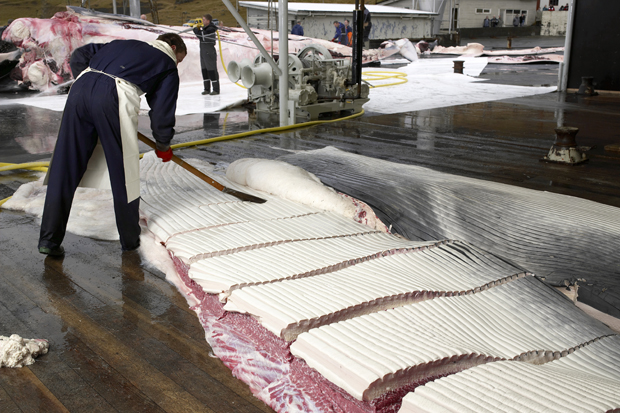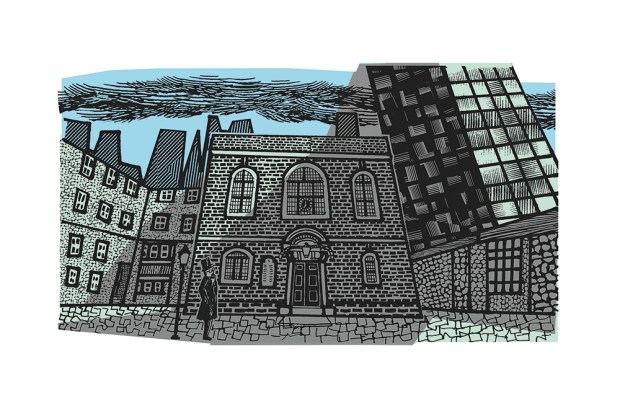Toftir, Faroe Islands
Almost twenty years ago I founded a heavy metal band called Týr. Our songs, with titles such as ‘Blood of Heroes’ and ‘Lady of the Slain’, might not appeal to all Spectator readers — but we’ve released seven albums and toured several times across Europe and America. Our album covers depict bloodstained swords and skulls; nobody finds them too upsetting. But when I posted a picture of myself cutting up a whale on Facebook, all hell broke loose.
I live in the Faroe Islands, where whaling has been part of our way of life for centuries. Last month, I was working on a long-finned pilot whale the day after it had been killed. Since more than four-fifths of the world’s population eats meat, I thought it would be fine to share such a picture — it’s no secret, surely, how meat is produced? But uproar followed. A campaign was launched to cancel my band’s gigs and stop venues booking us.
We seldom see pictures from inside slaughterhouses. As a result, people have strange ideas about meat — they seem to believe that animals are willingly and painlessly slaughtered behind closed doors. Ethically, I don’t see the difference between slaughtering wild whales and farmed cows. All animals suffer: if you can slaughter cows for meat, why not slaughter wildlife?
Whaling is illegal in the European Union, but the Faroe Islands are not (mercifully) in the EU. The Faroese whale hunt is non-commercial and organised at a community level. Nobody goes out searching for whales, but when a pod of them comes close to land, a hunt — or grindadráp — can be undertaken. It depends on how far away the whales are, if the ocean currents are favourable, and whether we are running low on whale meat.
Whales are killed with a special lance that cuts off the spine and the blood supply to the brain in one stab. Naturally, there is a lot of blood running into the ocean. It may look gory, but it’s no worse than what you would see in any slaughterhouse. Like any modern country, the Faroe Islands have strict welfare regulations: vets say this is the most humane method to kill a whale.
When the hunt is over, all participants get a share of the meat, and if there’s enough left over, locals receive a share too. That is what I was doing in the picture — cutting off my share. I was rewarded with around 150lb of prime quality whale meat for my work. Buying the same amount of beef would have cost me more than £800.
In the Faroes, it is not uncommon to kill your own dinner — be it sheep, fish, bird or hare. I have slaughtered many more sheep than I have cut up whales and no one seems to care. I find that strange. Why the double standards? Because whales are endangered? The ones we eat aren’t. There are an estimated 780,000 long-finned pilot whales in the Atlantic. In the Faroe Islands, we kill about 800 a year on average — or 0.1 per cent of the population. An annual harvest of 2 per cent is considered sustainable: compare that with the billions of animals bred for slaughter.
Whales may be relatively intelligent, but so are pigs — and they are slaughtered without much concern. To the Faroese, our whales are just another kind of animal that naturally exists in abundance. We’re sometimes told that whale hunting belongs in the past, that it should have died out with Moby-Dick. But could the same not be said about all meat–eating? I could argue that everyone who hunts and eats wildlife is sparing farmed animals years of unhealthy captivity.
The campaigners who want to cancel our concerts on account of these pictures are of the same mindset as flat-earthers or the conspiracy theorists who argue that the vapour trails left by jet engines are full of mind-controlling chemicals. An outfit called the Sea Shepherd Conservation Society has led the charge against Faroese whalers. I’ve written a song about it all, called ‘Rainbow Warrior’.
I have never actually killed a whale myself, and probably never will. But I take part in the grindadráp for the food — that’s the Faroese way and has been for generations. The idea that whaling is somehow immoral, in a way that killing cattle in abattoirs is not, does not bear scrutiny. As I sing in ‘Rainbow Warrior’: ‘Our ways, unchanged for centuries, do dismay concrete hearts.’ And, for that matter, irrational minds.
The post Save the whale-hunt! appeared first on The Spectator.
Got something to add? Join the discussion and comment below.
Get 10 issues for just $10
Subscribe to The Spectator Australia today for the next 10 magazine issues, plus full online access, for just $10.
You might disagree with half of it, but you’ll enjoy reading all of it. Try your first month for free, then just $2 a week for the remainder of your first year.














Comments
Don't miss out
Join the conversation with other Spectator Australia readers. Subscribe to leave a comment.
SUBSCRIBEAlready a subscriber? Log in